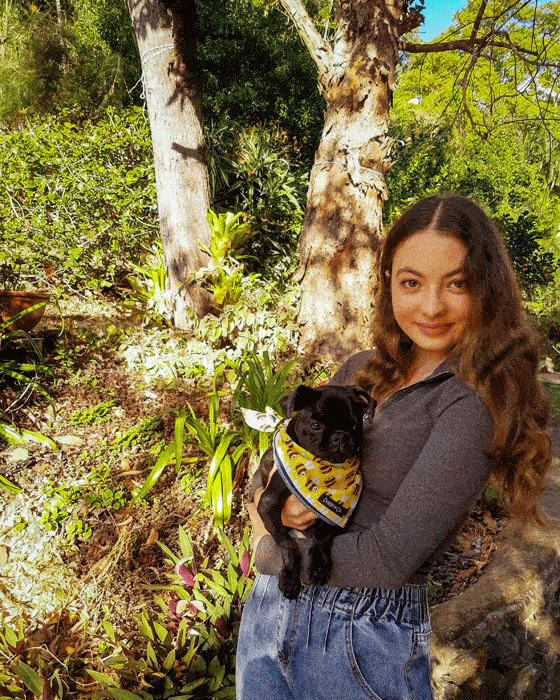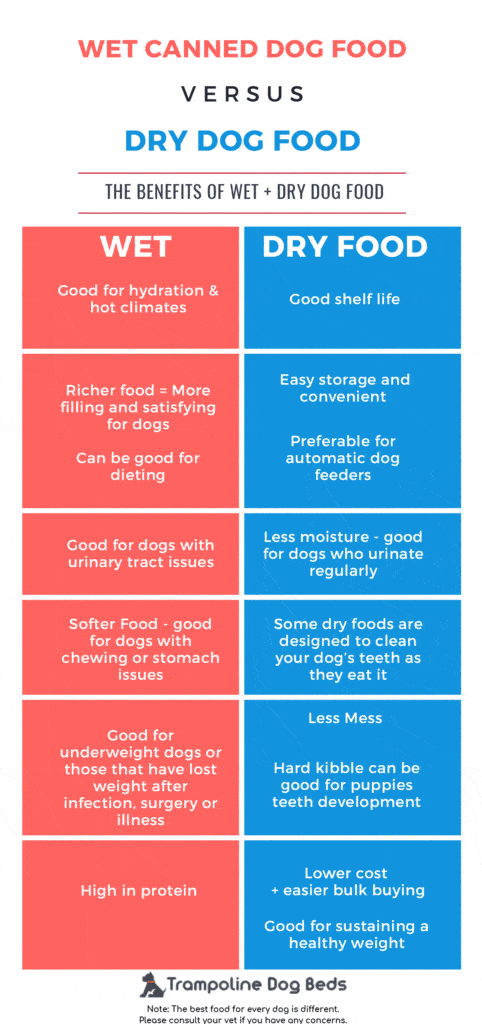Look for the words complete or balanced on packaging because that’s an indicator a good variety of nutrients, vitamins and protein that your dog needs are included in the food.

You’re standing in the pet food aisle, (and sometimes spending way too much time online), trying to compare the nutritional value vs ingredients vs cost to figure out which dog food is the best. Does this sound familiar? The choice is confusing.
Choosing the best for your dog is made harder as some brands advertise competing benefits of different diets and segment their products by dog size and breed.
We’ll work through the topics here and break down the key things you need to know about choosing dog food.
What are the different types of diets for dogs?
Grain-free and low grain diets
Only a very few dogs have grain allergy issues. Although low grain diets are considered the latest ‘best thing’ to try, it may not be worth it unless your dog has a specific allergy because carbohydrates are an important part of your dog’s diet. Including grains in your dog’s diet helps with gut health and fibre intake.
Dry food vs canned food
Comparing a diet of dry dog food (kibble) to a canned food diet has pros and cons depending on the needs of a particular dog and your circumstances.
Raw diet
These diets have grown from the idea that dogs developed from meat-eating, carnivorous wolves. The raw diet tends to be mainly meat-based with some added vegetables.
Feeding your dog raw meat is safe, but the RSPCA recommends checking with your vet first and only feed your pet human-grade meats.
As dogs evolved over time, their needs have changed and they don’t need to go back to their roots or wolf diet. Raw diets are safe for dogs but you have to make sure they’re getting all other vitamins and minerals needed to ensure a balanced healthy diet.
Vegetarian and vegan diet for dogs
There are few reasons for and against trying the vegetarian and vegan dog diets. These diets have been known to meet dogs’ nutritional needs. But even though some dogs that go vegetation or vegan are perfectly healthy, it can be a difficult diet to manage.
Your pet’s health is incredibly important and it’s crucial they get all the nutrients they need. It can be hard to sustain a good balance for your pet on a vegetarian or vegan diet. If you want to explore this diet further be prepared. Do your research and don’t forget to consult your vet.
A popular reason for vegetarian and vegan diets is the positive environmental impacts and carbon footprint. A 2017 research study found that through their diet, “cats and dogs are responsible for 25 to 30% of the environmental impact of meat consumption in the United States.” By changing your dog’s diet to vegetarian or vegan, it can help reduce carbon footprint and support the planet!
What food should I give my old dog?
The best diet dog food for older dogs will depend on their health problems
As they age senior dogs can often face issues with weight, eating and chewing. Here are a few general things to consider if your dog has weight or dental issues.
Overweight senior dogs
If your dog is overweight, it might be best to consider feeding dry kibble over wet food, as dry food tends to have a lower fat content.
Underweight senior dogs
For older dogs that have issues maintaining a healthy weight or struggle to put on weight, wet food can be ideal for boosting and sustaining a consistent healthy weight due to its fat content.
Dental issues in senior dogs
As dogs get older they can have dental issues and lose teeth. Hard dry kibble can be tough for them to eat every day. In this case, it’s worth considering either providing your dog with canned wet food or a mix of wet and dry foods.
What’s the best food for adult dogs?
If your dog has minimal health problems and is sufficiently active by the standards for their age and breed, then most standard dog foods which advertise ‘balanced’ diet should be perfectly fine. But if your dog is less active or has weight issues look for labels which contain words like ‘adult maintenance’.
There are less specific requirements and concerns to choosing food for healthy adult dogs. As this is the biggest market, most brands cater extensively for them.
What are the best, healthy dog food treats?
Carrots, beans, peanut butter, banana and watermelon are some of the best natural treats that dogs will love.
| Treat | Benefits | Caution |
|---|---|---|
| carrots | source of vit A | too much vit A can be toxic |
| helps clean dog's teeth | ||
| activity that keeps dog occupied | ||
| green beans | source of vitamins A, B6, C, K, iron, protein, calcium | cut into small pieces as potential choking hazard |
| must be free from added salts, sauce, spice | ||
| peanut butter | contains healthy fats, vitamins and protein | treat should be used in moderation |
| beware of product containting xylitol (sugar substitute) | ||
| banana | source of potassium Vit C, B6, fibre | high in sugar; feed in moderation |
| don't let dog eat banana peel | ||
| watermelon | high water content = hydrating | remove seeds |
| source of Vit A, B6, C |
How often does my dog need to eat?
A healthy, balanced and controlled diet is key. So before you start considering what to buy your dog, it’s important to assess their eating needs and schedule. Some dogs can’t get enough food and live their lives driven by it, while other dogs can be extremely picky and can need a lot of convincing to eat an entire meal.
Puppies
They can’t go long periods without food and need regular smaller sized meals. Usually 3 times a day.
You can start thinking about dropping back meal times to twice a day once puppies reach about 16+ weeks. Transitioning meal time can be tough – if you’re having issues or are unsure about your dog’s needs talk to your vet.
Adult dogs
Different breeds age at different stages. Small and medium dogs like Chihuahuas are considered adults at around 12 months but large dogs such as Great Danes, aren’t considered adult dogs until up to 24 months.
It’s important to know your dog’s age and stage in life because this impacts their needs and required diet. Adult dogs are generally fed a meal either once or twice a day. Although you can feed your adult dog once a day, if you choose to break up the meal it can help their hunger levels, attitude and digestion.
Senior dogs
The transition from adult to senior dog is also different for different size breeds. For example, very small breeds are considered senior dogs when they reach about 10 human years, but larger breeds like Great Danes reach seniority at around 7 years.
Senior dogs generally go back to the eating schedule of a puppies, where they have 2 to 3 smaller meals a day.
What to remember when buying dog food
Your dog needs a nutritional and balanced diet. So when you’re strolling the pet food aisle or scrolling on the internet for the best food, look for the words “complete or balanced”. These words indicate a good nutritional range of vitamins and protein.
The dietary needs of your pet changes over time, so monitor them and discuss their diet with your vet.
It’s also recommended you check the label on the food to make sure the company abides by the Australian Standard for the manufacturing and marketing of pet food.
Your dog’s medical history, stage of life and lifestyle are the factors needed to determine the best diet for you dog.
Resources for further reading:
You might also like
 Nutrition for Old Dogs : Dog Food and Supplements
Nutrition for Old Dogs : Dog Food and Supplements How to Clean Dog Bedding and Shampoos
How to Clean Dog Bedding and Shampoos Washable Dog Blankets
Washable Dog Blankets How to Stop Dogs Chewing their Bed / Destructive Chewing
How to Stop Dogs Chewing their Bed / Destructive Chewing Mastering Puppy Sleep : Tips for a Restful Night
Mastering Puppy Sleep : Tips for a Restful Night How to Get Your Dog to Sleep Later in the Morning
How to Get Your Dog to Sleep Later in the Morning Most Dangerous Foods for Dogs and 5 of the Best
Most Dangerous Foods for Dogs and 5 of the Best Pooper Scooper with a Long Handle – All in One
Pooper Scooper with a Long Handle – All in One Nutrition for Puppies – Top Food Picks and FAQs
Nutrition for Puppies – Top Food Picks and FAQs Electric Heated Dog Beds
Electric Heated Dog Beds



